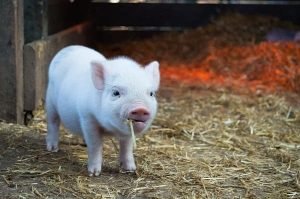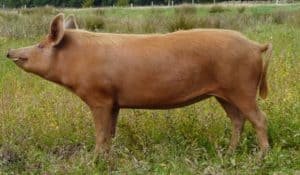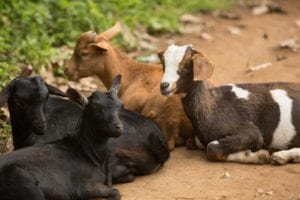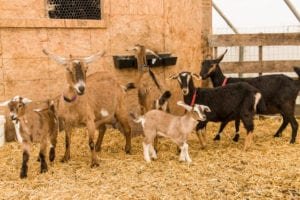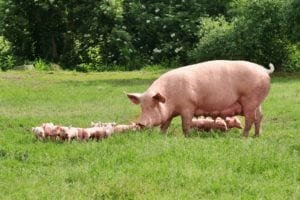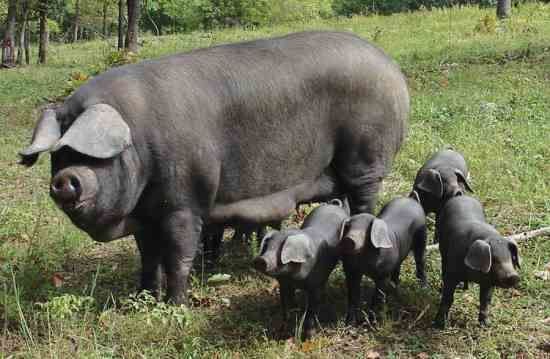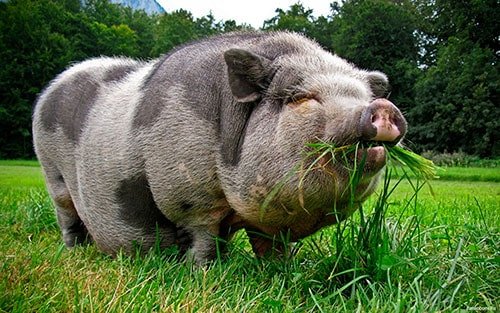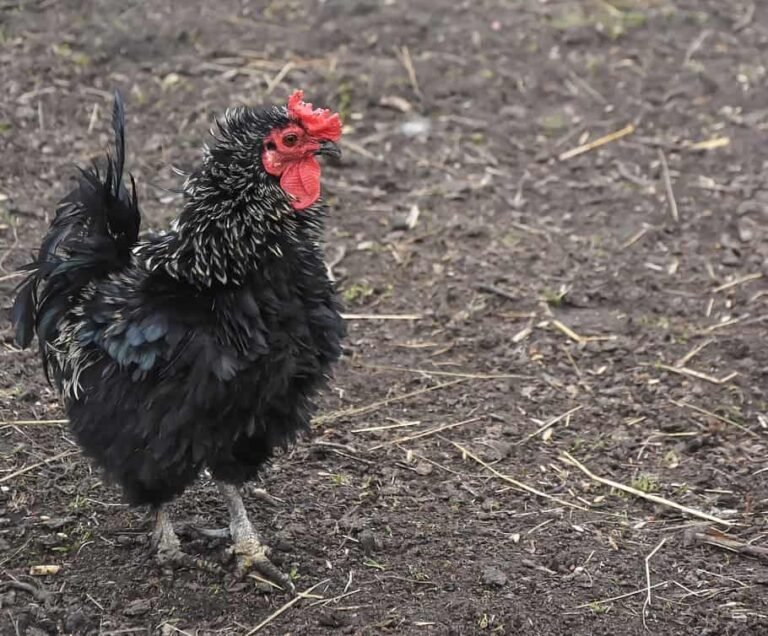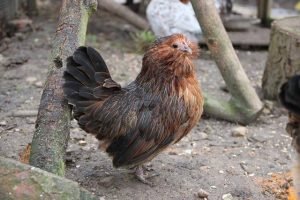Yorkshire Pig: Characteristics, Origin, Breed Info, and Lifespan

Just before you proceed to get the popular Yorkshire pig for your pig farm, be sure to read this article till the end.
What you will find in this write-up will help you in making the decision whether to choose the Yorkshire pig or not.
You will get to know about the origin of the Yorkshire pigs, their characteristics, and their interesting behaviors.
Also, in this article, you’ll find why the Yorkshire pigs are the best for your farm, what they are popular for, and the disadvantages of having them.
In addition, you will find answers to most of the frequently asked questions about the Yorkshire pig breed.
If you prefer to have other breeds of pigs on your farm, then you may want to check out our article about Duroc Pig Breed and Landrace Pig Breeds.
For now, let’s get the full details of Yorkshires.
What is a Yorkshire pig?
The Yorkshire pig is an exotic breed of domestic pig that is very rugged and strong.
They are usually white in color.
Yorkshire pigs are one of the most sought-after pigs around the world.
This is because they are the leading breed for bacon production.
Also, their pork stands out among other breeds with reasonable fat content and more tender muscle.
This is unlike the old Yorkshire breeds which were much smaller in size and weight.
What is the origin and history of Yorkshire pigs?
This white pig breed is a British pig that was developed in the 18th century.
Robert Bakewell was interested in a local tribe of pigs called the Leicestershire pig breed found in England.
He modeled this breed into a very productive and large pig breed around the mid-18th century which became very popular among the British.
Some, if not most, of the best large white pigs came from here.
The Yorkshire breed was first obtained by crossing the large local white pigs of north England with the smaller and fatter white Chinese pigs.
Later the name was changed to English large white even though it is still called Yorkshire around the world.
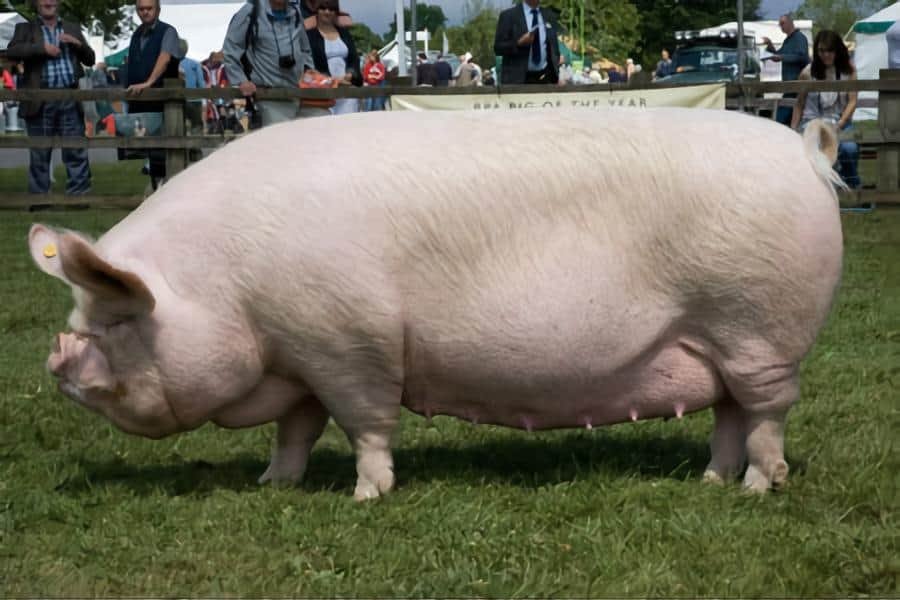
Types of Yorkshire pig breeds
There are three different varieties of the Yorkshire pig, these are;
- The large white (Yorkshire)
- Middle white (middle Yorkshire)
- Small white (small Yorkshire)
1. The large white (Yorkshire):
This variety of the Yorkshire pig has been well maintained and carefully bred for increased productivity and quality.
Only the large white pig breed developed well over time and showed relative importance and became a very good popular breed.
2. Middle white (middle Yorkshire):
These ones are now going extinct and they are in the priority classification of the rare breed survival trust.
Meaning they are at the highest level of risk of breed extinction.
The middle Yorkshire was produced from the crossing of the large white and the small white.
3. The small white pigs (small Yorkshire):
The small white pigs are now extinct, but they were common in the 19th century.
They were used to produce the middle white pig breed and some other breeds.
Today, only the large white pigs or the Yorkshire are popular, more durable than others, and very productive yet more performance-oriented.
What are the characteristics of Yorkshire pigs?
Physical characteristics of Yorkshire pigs
1. Size:
Yorkshire pigs are a large and long breed of pigs.
They have heavily built bodies supported by long legs compared to other pigs.
2. Colour:
The Yorkshire pig breed looks big and White in color when looked at from afar.
But on closer observation, you will notice their pink-colored skin.
3. Head:
Yorkshire pigs have slightly dished faces with moderately long heads and moderately big jowl.
Their head tends to grow bigger as they mature.
4. Body:
Their body looks muscled and they have reasonable fat on them.
They have a big bodies with lean meat and well-formed bacon.
5. Ears:
Yorkshire pigs have their ears standing upright and erect.
6. Weight:
Yorkshire boars can weigh about 550-750 pounds, which is 250kg- 350kg when placed on a proper diet.
The Yorkshire sow is around 450-650 pounds that’s about 200kg – 300kg.
7. Snout:
Their snouts are Medium-sized in length and are sensitive, with a small nose.
They are muzzles ending with rounded cartilages useful in sniffing and digging for food.
8. Teeth:
Pigs are omnivores and as such have the same dentition generally.
The teeth arrangement has the molar far behind, then the premolar, canine, and incisors in the front.
9. Tusks:
Yorkshires have no visible tusks while growing.
Their canine teeth are small and even quite smaller in the boar.
10. Hooves and claws:
Large white pigs have a cloven hoof that seems divided.
They walk on these hooves which are connected to the strong legs supporting their body weight.
11. Tail:
Yorkshires have short curly tails behind their body.
Intrinsic characteristics of Yorkshire pig breeds
12. Behaviour:
Yorkshire pigs are well-mannered breeds of pigs with very friendly characters and docile attributes.
They are very sensitive and mindful of their environment and very easy to instruct.
Sometimes, these intelligent animals get emotional and can be very happy or moody depending on the treatment they get.
They show great care for their young ones.
13. Climate adaptability:
Yorkshire pig breeds are well adapted to all the climates around the world.
They are popular breeds that are found everywhere both in hot and cold regions.
They have such thick skin for harsh weather protection.
14. Growth:
Yorkshire pigs reach above 115kg (250 pounds) in about 5-6 months.
This is about the time they reach sexual maturity and slaughter weight too.
The kind of feed and forage they are exposed to pre-determines how efficient their weight gain will be.
Yorkshire has a fast growth rate and gains good weight while maturing.
15. Breeding/Reproduction:
A Yorkshire sow carries its pregnancy for about 114 days after which it farrows with a litter size of 10-12 piglets.
They are excellent milk producers that take good care of their young ones.
Hence their piglets have a high survival rate.
16. Meat quality:
The Yorkshire pig breed has been diligently bred to improve the pork quality.
They are widely recognized for their quality bacon and lean meat.
Also, the Yorkshire pigs are a good source of pork chops and pork ribs of good quality.

Why choose Yorkshire pigs?
1. Yorkshire pigs are good mothers with great maternal instincts:
They do a fine job raising their piglets till the weaning stage with their good maternal instincts.
Although, they need to be watched and assisted during childbirth so that they do not kill the piglets with their weight.
2. They have a sizeable amount of litter:
Yorkshire pigs are called the mother breeds and they excel in litter size, good rebreeding interval, weaning weight, and great birth size.
They are excellent milk producers to accommodate their big-sized litter.
They have about 10-12 liters at once.
3. Excellent breed for the purpose of crossbreeding:
Due to a lot of desirable traits of the large white pigs they are crossbred with other varieties of pigs to get more favorable offspring.
4. Yorkshire pigs are well adapted to harsh climatic conditions:
This very durable breed of pigs has thick skins.
As a result, they can easily adapt to the different climatic conditions around the world.
5. Yorkshire pigs are well mannered and docile pig breed:
Yorkshire pigs are intelligent breeds and very friendly to owners.
They are also obedient and interactive social animals that always listen when instructed.
6. They are efficient foragers and great feed converters:
Pigs generally are good at foraging and can be fed almost anything.
They consume anything from nutritious pig foods to grasses, edible kitchen wastes, insects and worms and so much more.
Interestingly, Yorkshire pigs are very efficient forage converters as they do excellently well with a rapid growth rate on forage.
They are omnivores meaning they consume both plants and animals.
7. Yorkshire pig is documented as one of the best-performing pig breeds in the world:
The Yorkshire pigs are not just popular breeds around the world but more importantly, they are well documented in their performance records.
Just within 1990-2006, the large white pig breeders submitted over 320,000 sow productivity records and over 440,000 backfat pork records.
8: Yorkshire Pigs are the most recommended exotic pig breeds for commercial pig farming:
They have such fantastic market value that makes them the number one farmers’ choice.
As they are easy to handle, friendly, and adapt well to confinements.
Hence, they are highly recommended to pig farmers.
9. They do well in confinements just as much as extensive farming systems:
Yorkshire pigs are one of the very few pigs that have good productivity even in confinements.
This makes them a common breed among commercial pig farmers.
However, they are large animals that require a well spacious environment to live in.
What are the disadvantages of rearing Yorkshire pigs?
1. Their big size doesn’t make them suitable as domestic pig pets:
Even though Yorkshire pigs are friendly and very active breeds.
Pet owners are usually discouraged by their large size.
2. Yorkshire pigs needs enough space:
Their large size makes them really space-consuming.
Even when kept in confinements and from free roam pigs still take up quite some space.
The more they grow in size the more space they require.
3. They can create a lot of mess and are potentially destructive:
If you allow your pigs to run around sometimes you’ll find that they are very good at creating a mess and sometimes they prove stubborn.
They get playful sometimes and become potentially destructive friends.
4. Very sensitive to mismanagement easily stressed with low maintenance:
With all of these interesting facts and information about the Yorkshire pigs.
If you decide to keep and rear them commercially in confinements then you must be responding for them.
They don’t need full attention but they need to be well managed and maintained otherwise their productivity is very much affected.
Frequently Asked Questions About Yorkshire Pigs
Are Yorkshire pigs good for meat?
Yorkshire pork contains lean meat with reasonable fat-rich muscles.
They are good meat with a high market value and demand.
Yorkshire pigs are used mainly for bacon, ham, and pork ribs.
Can Yorkshire pigs be trained as pets?
Yorkshire pigs are very easy to instruct and are intelligent friends that make good companion animals.
They are docile breeds that do well in confinements, always attentive and not aggressive.
Their friendliness makes them good pets as they also enjoy being around people.
How old does a Yorkshire pig have to be to breed?
A piglet is weaned from the sow to the first month or two after birth.
After which, they are allowed to grow and develop for another 4 months before they are sexually mature.
Hence, Yorkshire pigs are ready to breed at about 5½ months after birth.
How long does a Yorkshire pig live?
Yorkshire pigs live between 6-10 years of age.
That is if they do not end up being slaughtered in a year or two.
What do Yorkshire pigs eat?
Pigs are superb foragers that roam their own turf and provide themselves with tasty meals from fruits, grass, hay, worms, and insects.
They can also be fed with kitchen waste like yam peels, wasted cooked grains, etc.
Hence, they are cost-effective animals, especially the Yorkshire breed which is an excellent forager.
Yorkshire pigs also eat industrial pig food in pellet form with varieties of vitamins and nutrients.
How fast do Yorkshire pigs grow?
One of the reasons the Yorkshire pig breed didn’t gain popularity until the late 19 century was that their growth was not rapid.
Whereas, over time the breed improved better with a fast growth rate through selection and diligent maintenance of growth productivity.
Now, Yorkshire’s large white pigs are in great demand because of their rapid growth rate and good forage conversion.
It takes Yorkshire pigs about 5-6 months to reach sexual maturity and the slaughter weight of about 115kg (250 pounds).
How big will Yorkshire pigs get?
Yorkshire or large white pigs have a good size and a fast growth rate.
The board can get up to 550-750 pounds in size.
On the other hand, the sow weighs much less than the males, they weigh about 450-650 pounds.
Are Yorkshire pigs good for crossbreeding?
A Yorkshire boar is always very energetic and actively ready to service the sow and other pig breeds.
Impressive pork quality traits amongst others often make farmers crossbreed the Yorkshire pigs with other breeds.
What is the lifespan of Yorkshire pigs?
Most Yorkshire pigs today only live up to 24 weeks before they are slaughtered.
However, Yorkshire pigs can ultimately live up to 6-10 years of age if cared for and fed properly.
What are the habitat and environment of Yorkshire pigs?
Yorkshire pigs are kept in confinement and known to do excellently well in extensive farming systems too.
Where they are allowed to roam, forage, and wander around they have such rapid growth.
Pigs are actually animals with clean personalities and a good sense of decency.
As opposed to the opinion that pigs are dirty animals that love a dirty environment, these clean animals love their environment and habitats clean.
How much space do Yorkshire pigs need?
Generally, the estimate varies widely depending on what you have to work with, the facilities available, and the land.
The spacing requirements will also depend on the age and size of the pigs involved.
Young growing Yorkshire in confinements requires about 8 square feet per pig since they are not hyperactive and always running around.
Conclusion
Yorkshire pigs are an exotic breed of pigs that have been carefully selected and diligently bred to fill the large request for quality bacon, ham, and pork generally.
They have very fast growth, good mothering skills, excellent milk production, and good litter size.
Hence, they are the best pig for every large-scale farmer.
References:
- What do Pigs Eat? [Most Essential Food for Pigs]
- Tamworth Pig breed- Characteristics, Origin, Breed info and Lifespan
- How to start goat farming business
- 3 Cheap and Easy Goat Housing Construction Styles
- Different Types of Pig Breeds for Pig Farming Business
- Benefits of Starting a Commercial Pig Farming Business
